Table of Contents
- Why Is Automotive Cybersecurity Important?
- 1. Protecting Consumer Safety
- 2. Regulatory Compliance
- 3. Preventing Data Breaches
- 4. High-Demand Job Market
- Overview of Automotive Cybersecurity Certification
- Key Learning Areas in Automotive Cybersecurity Certification
- Who Is It For?
- Benefits of Earning an Automotive Cybersecurity Certification
- Top Automotive Cybersecurity Certifications
- How to Maximize Your Automotive Cybersecurity Certification
- Final Thoughts
- FAQ – Automotive Cybersecurity Certification
With the rapid rise of connected vehicles, autonomous driving technologies, and the electrification of modern vehicles, the automotive industry has seen dramatic transformations. These advancements have ushered in an era of innovation but also introduced substantial cybersecurity vulnerabilities. The integration of advanced software systems, sensors, and data exchanges has made modern vehicles susceptible to cyberattacks, leading to potential safety risks for consumers. As a result, Automotive Cybersecurity has become one of the most important fields in securing the future of transportation.
An Automotive Cybersecurity Certification is crucial for professionals who want to contribute to securing vehicle systems, ensuring data integrity, and mitigating the risks associated with cyber threats in the automotive domain. Whether you’re an automotive engineer, a cybersecurity professional, or an IT enthusiast looking to specialize in this booming industry, obtaining this certification—along with following the Cybersecurity Analyst Certification Path in 2025—will give you the knowledge and expertise to excel in a rapidly evolving and highly competitive field.
Why Is Automotive Cybersecurity Important?
With connected vehicles becoming more commonplace, the threat landscape has expanded significantly. Cyberattacks can target everything from vehicle software to in-vehicle communication systems, making the role of cybersecurity in the automotive sector more critical than ever before. Here’s why Automotive Cybersecurity is essential:
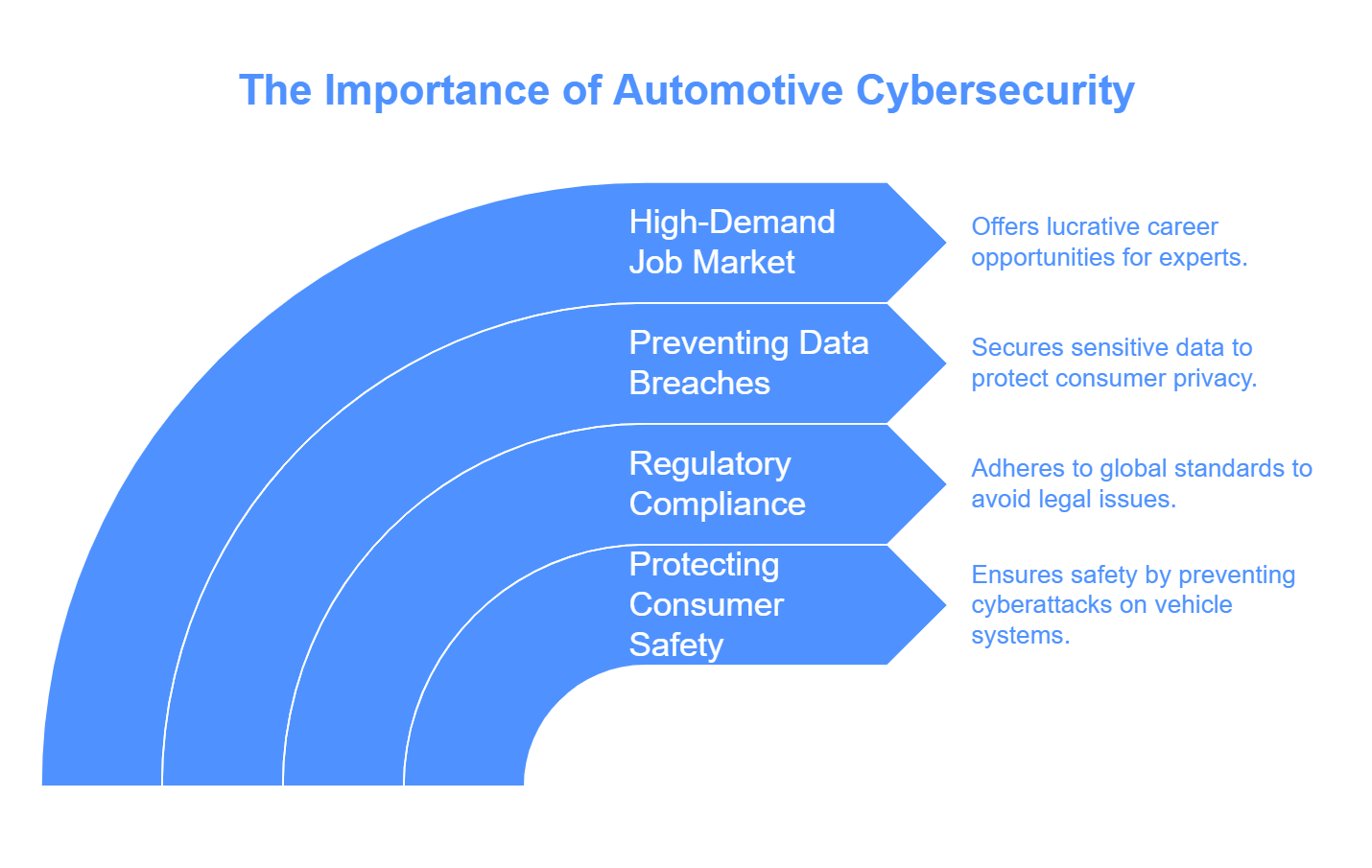
1. Protecting Consumer Safety
Advanced Driver Assistance Systems (ADAS), vehicle-to-everything (V2X) communication, and autonomous systems are transforming the driving experience, but they also present new vulnerabilities. Cybersecurity plays a vital role in ensuring the safety of consumers by preventing cyberattacks that could interfere with vehicle functionality, such as remotely controlling brakes or steering systems. These systems need constant monitoring and protection against unauthorized access to guarantee passenger safety, making cybersecurity a critical area of focus for the automotive industry.
2. Regulatory Compliance
As vehicle technology becomes more interconnected, governments worldwide are introducing more stringent cybersecurity regulations. For instance, ISO/SAE 21434 and UNECE WP.29 are global standards that automotive manufacturers must adhere to in order to safeguard the security of their vehicles and networks. These regulations require organizations to implement robust cybersecurity measures during the design, development, and manufacturing processes. Professionals with an Automotive Cybersecurity Certification are essential in ensuring compliance with these evolving regulations, preventing legal and financial repercussions for non-compliance.
3. Preventing Data Breaches
Modern vehicles are equipped with a vast array of connected technologies that exchange data in real time. This data, which includes information about a driver’s location, driving habits, and vehicle performance, could be exploited if compromised. A breach of such sensitive information can not only damage an automaker’s reputation but also result in significant legal and financial consequences. Therefore, securing this data and preventing breaches is paramount for manufacturers to maintain their credibility and protect their customers.
4. High-Demand Job Market
The rise in demand for connected vehicles has led to a significant increase in job opportunities for automotive cybersecurity professionals. As the industry becomes more digitized and interconnected, automakers are allocating large budgets toward cybersecurity research and development. Certified experts in automotive cybersecurity are sought after to protect vehicle systems, making this a high-paying niche with strong career prospects. With the increasing complexity of the cybersecurity threat landscape, certified professionals are needed more than ever to safeguard automotive systems against potential attacks.
Overview of Automotive Cybersecurity Certification
An Automotive Cybersecurity Certification is designed to validate a professional’s ability to secure automotive software and systems effectively. It covers a range of critical areas, including secure coding, threat modeling, incident response, and compliance with automotive standards like ISO/SAE 21434. These certifications are essential for professionals aiming to develop the skills necessary to secure the growing number of connected and automated vehicles. Additionally, obtaining a Cybersecurity Leadership Certification can further enhance a professional’s ability to lead security initiatives and implement robust protection strategies within the automotive industry.
Earning an Automotive Cybersecurity Certification demonstrates a professional’s ability to identify, assess, and mitigate security risks for automotive systems. The curriculum emphasizes the application of theoretical knowledge to real-world problems, ensuring that graduates are equipped to handle the evolving cybersecurity challenges facing the industry today.
Key Learning Areas in Automotive Cybersecurity Certification
To excel in the automotive cybersecurity field, professionals need a well-rounded understanding of various concepts. Below are the key learning areas covered in the certification:
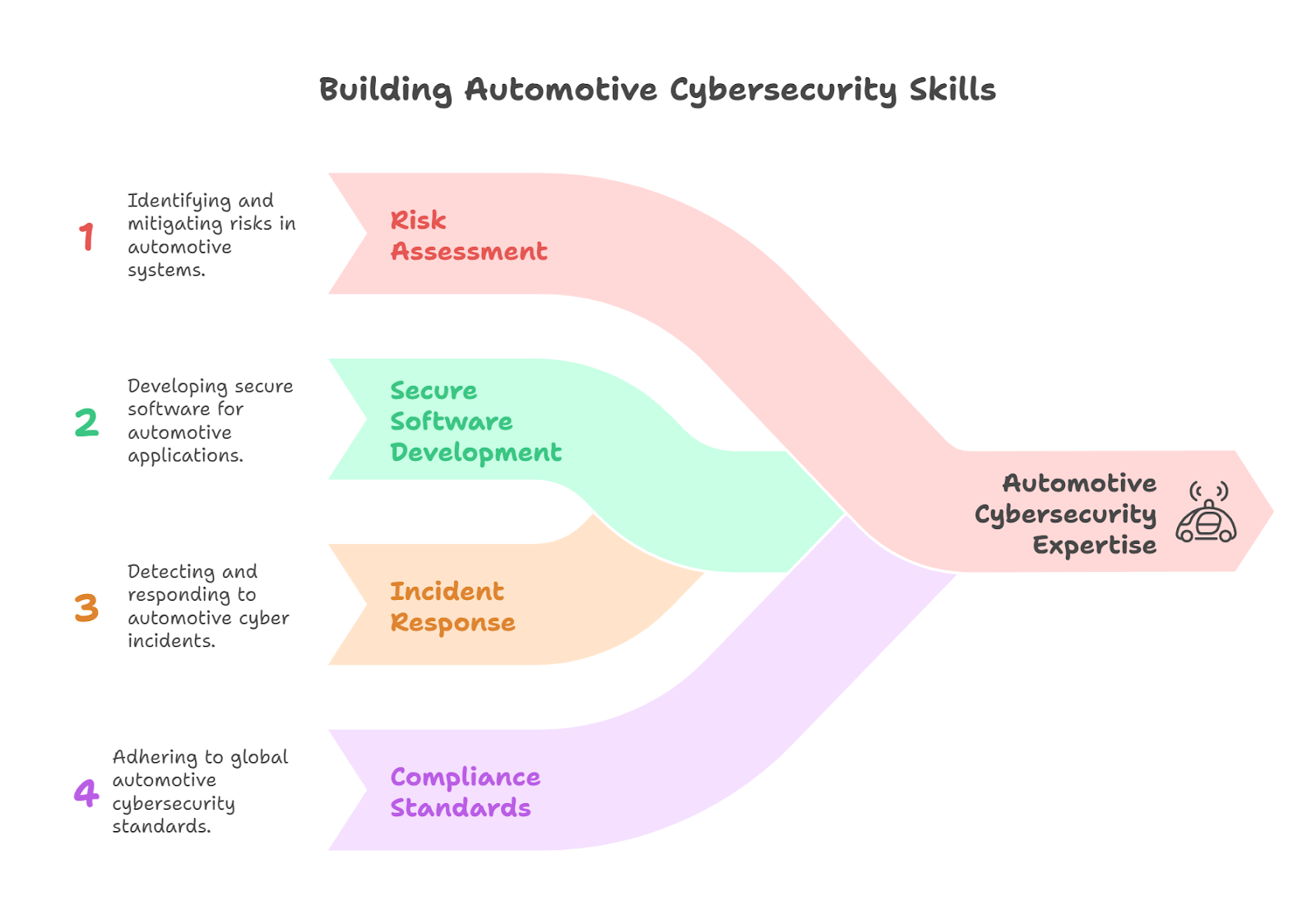
1. Risk Assessment and Vulnerability Analysis for Vehicle Systems
Understanding the risks and vulnerabilities present in automotive systems is the first step to securing them. The certification teaches how to perform risk assessments, identify potential vulnerabilities in vehicle networks and software, and apply effective mitigation strategies. This skill is crucial for preventing attacks that could exploit system weaknesses, such as unauthorized access to in-vehicle communication systems or remote hijacking of vehicle controls.
2. Secure Software Development and Life Cycle Management
A significant part of the program focuses on the principles of secure software development. This includes ensuring that automotive software is designed and implemented with the highest standards of security throughout its lifecycle. From initial development to deployment, the certification emphasizes creating secure software that can withstand potential cyber threats and prevent vulnerabilities from being introduced during the development process.
3. Incident Detection and Response Strategies for Automotive Networks
Given the growing complexity of modern vehicles, incident detection and response strategies are vital. The certification provides a comprehensive approach to identifying potential cyberattacks in real time, managing security breaches, and restoring normal operations following an incident. These skills are essential for quickly containing attacks and minimizing damage to vehicle systems, ensuring the safety of the vehicle occupants and the integrity of the data being transmitted.
4. Compliance with Global Automotive Standards and Cybersecurity Frameworks
Compliance with global standards such as ISO/SAE 21434 is an essential part of the certification. The program ensures that professionals are familiar with the industry’s regulatory requirements, teaching them how to develop, implement, and monitor cybersecurity policies in line with these standards. Understanding the cybersecurity frameworks used in the automotive industry helps professionals ensure that their work meets international requirements for cybersecurity.
Who Is It For?
The Automotive Cybersecurity Certification is ideal for professionals looking to transition into or advance in the field of automotive cybersecurity. It is specifically designed for:
-
Automotive Engineers and Designers: Engineers who are responsible for the design, development, and implementation of automotive systems can gain the skills necessary to secure those systems against cyber threats.
-
Information Security Professionals Transitioning to Automotive Cybersecurity: Cybersecurity professionals with backgrounds in other industries can enhance their skills by specializing in automotive systems.
-
IT Specialists and Software Developers: IT specialists looking to branch into automotive cybersecurity can leverage this certification to gain a deeper understanding of vehicle system security.
-
Compliance Officers and Legal Professionals in the Automotive Domain: Professionals responsible for ensuring that automotive manufacturers meet regulatory standards can benefit from a more thorough understanding of automotive cybersecurity regulations.
Benefits of Earning an Automotive Cybersecurity Certification
Earning an Automotive Cybersecurity Certification offers numerous advantages for those looking to specialize in this growing field. Here are some key benefits:
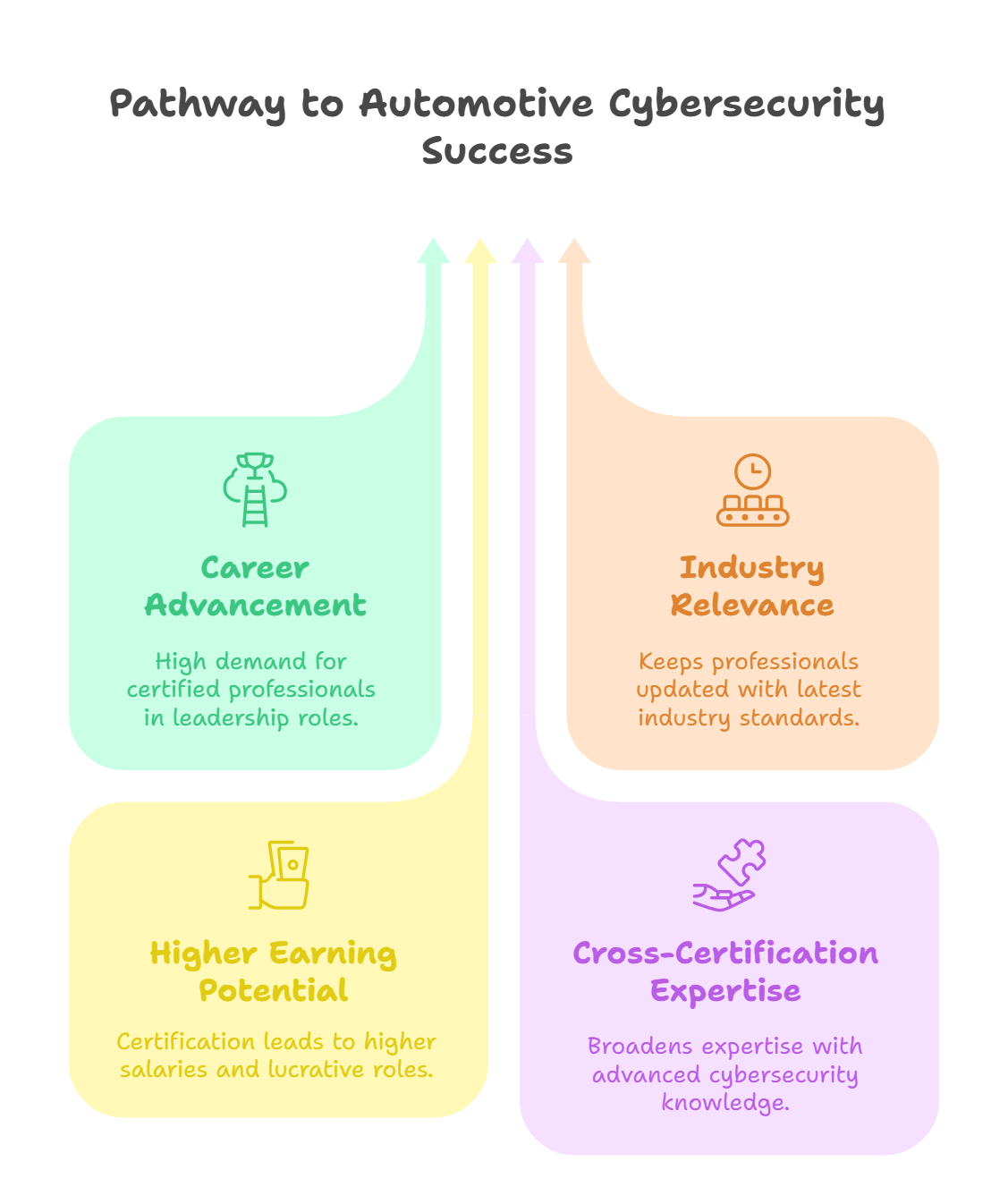
Career Advancement
Automotive manufacturers are increasingly allocating large budgets toward cybersecurity research and development. This means that professionals with Automotive Cybersecurity Certification are in high demand, and certified individuals can expect to progress quickly in their careers. The certification helps position professionals for leadership roles within the automotive cybersecurity domain, offering increased job opportunities and higher job security.
Staying Industry Relevant
The automotive industry is evolving rapidly, and staying up-to-date with the latest technologies and cybersecurity standards is essential. Earning an Automotive Cybersecurity Certification ensures that professionals remain relevant in the industry by providing them with the latest tools, frameworks, and strategies to combat the ever-growing cyber threat landscape.
Higher Earning Potential
Certified professionals in automotive cybersecurity can command higher salaries compared to their non-certified peers. According to industry data, automotive cybersecurity experts can earn up to 25% more than professionals without certifications. The certification acts as proof of expertise and demonstrates your ability to handle the critical security challenges faced by modern vehicles, making you eligible for lucrative roles within top automotive companies.
Enhance Expertise with Cross-Certifications
While the Automotive Cybersecurity Certification provides essential skills, pairing it with an advanced program like the ACSMI Certification allows professionals to broaden their expertise. ACSMI’s extensive curriculum, with over 400+ modules, covers advanced cybersecurity topics such as forensics, penetration testing, and advanced threat detection methods. This multi-domain expertise can provide a significant edge in the competitive job market.
Top Automotive Cybersecurity Certifications
If you’re looking to earn an ISC Cybersecurity Certification in 2025 or an Automotive Cybersecurity Certification, there are several top certifications available. These certifications can help you gain the knowledge and practical skills necessary for success in the industry:
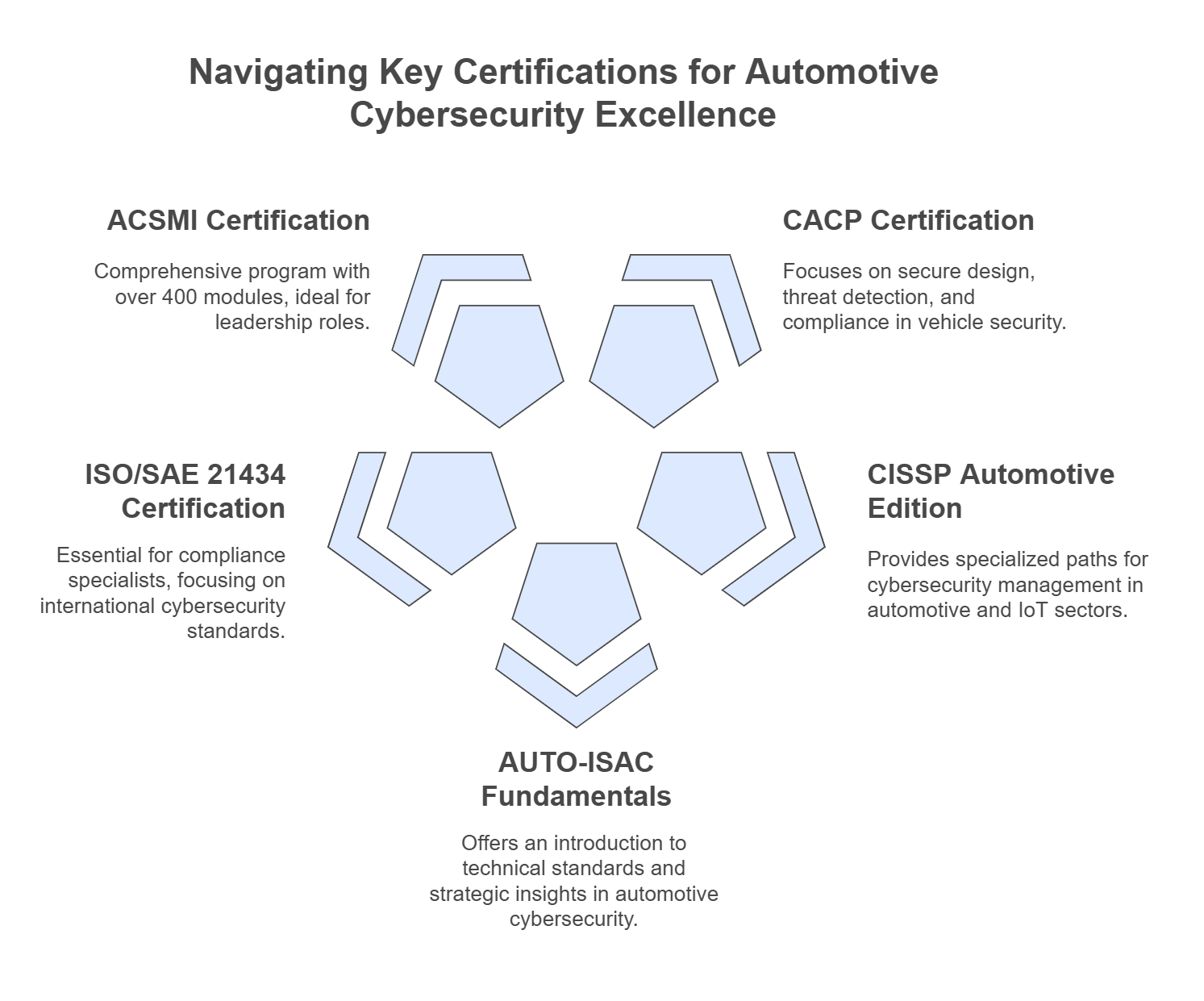
1. Certified Automotive Cybersecurity Professional (CACP)
The CACP certification is ideal for professionals specializing in vehicle security. It focuses on secure design, threat detection, and compliance, providing a solid foundation for those looking to work in the automotive cybersecurity field.
2. Certified Information Systems Security Professional (CISSP) – Automotive Edition
The CISSP Automotive Edition provides specialized paths tailored to the automotive and IoT industries, covering complete vehicle system protection. This certification is well-suited for professionals looking to advance in the field of cybersecurity management in the automotive sector.
3. Automotive Cybersecurity Fundamentals by AUTO-ISAC
The AUTO-ISAC certification offers an excellent introduction to automotive cybersecurity, focusing on technical standards and strategic insights. It is ideal for those new to the field and looking to gain a solid understanding of the security challenges and solutions in the automotive industry.
4. ISO/SAE 21434 Certification
This certification is essential for compliance specialists in the automotive sector. It focuses on adhering to international automotive cybersecurity standards, ensuring professionals are well-equipped to handle the regulatory requirements that govern the industry.
5. ACSMI Certification
The ACSMI Certification is one of the most comprehensive programs available, offering over 400+ modules tailored to advanced cybersecurity roles. Its flexibility and multi-cloud focus make it ideal for professionals aiming for leadership positions in automotive cybersecurity.
How to Maximize Your Automotive Cybersecurity Certification
To fully capitalize on your Automotive Cybersecurity Certification, here are several strategies:
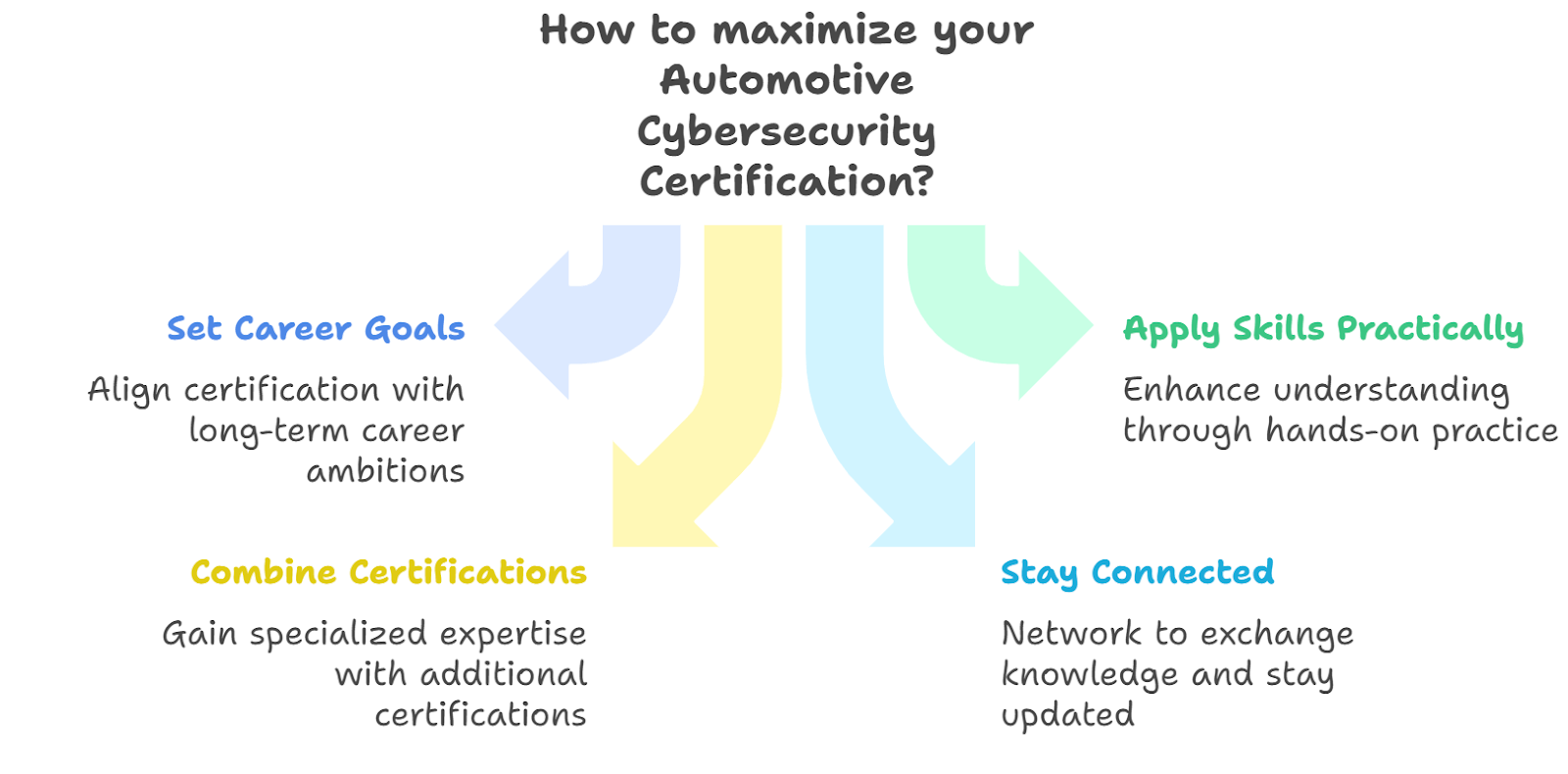
Set Career Goals
Identify your long-term career goals and tailor your certification choices to align with these ambitions. Whether you’re aiming for leadership roles or a more specialized technical career, setting clear goals will help you choose the most appropriate certification programs.
Apply Skills Practically
Pair theoretical learning with hands-on practice. By simulating real-world automotive hacking scenarios or applying your skills in cybersecurity applications, you can deepen your understanding and improve your technical abilities.
Combine Certifications
While a single Automotive Cybersecurity Certification is valuable, pairing it with an ACSMI Certification or other advanced programs can provide specialized expertise and prepare you for multi-faceted roles within the industry.
Stay Connected
Networking with professionals in the automotive cybersecurity field is invaluable. Attend cybersecurity conferences, participate in forums, and engage with professional communities to exchange knowledge and stay updated on the latest industry trends.
Keep Learning
The automotive industry is rapidly evolving, so continuous learning is essential to remain relevant. Keep your skills sharp by upskilling with new certifications and modules from programs like ACSMI.
Final Thoughts
The future of connected and autonomous vehicles depends on robust cybersecurity measures. With the Automotive Cybersecurity Certification, professionals gain the knowledge and skills needed to combat threats, ensure data integrity, and create a safer, smarter automotive ecosystem. For those aiming for advanced expertise, pairing this certification with the ACSMI Certification offers unparalleled learning potential, covering more specialized and advanced cybersecurity topics.
Start your journey today and secure your place in the rapidly growing field of automotive cybersecurity.
FAQ – Automotive Cybersecurity Certification
What is Automotive Cybersecurity Certification?
The Automotive Cybersecurity Certification validates your expertise in securing connected vehicle systems, addressing vulnerabilities, and ensuring compliance with global standards.
Why Should I Pursue It?
With growing cybersecurity risks in the automotive domain, the demand for certified professionals is exceptionally high. Earning this certification boosts job opportunities and expands earning potential.
Who Should Take This Certification?
This certification is ideal for automotive engineers, information security professionals, and software developers aiming for specialized roles in automotive cybersecurity.
How Long Does It Take to Earn?
Depending on the certification, courses can take anywhere from 2 to 6 months of part-time study. Advanced certifications like ACSMI Certification offer flexible learning durations.
What Are the Job Prospects Post-Certification?
A professional with an Automotive Cybersecurity Certification can pursue roles like Cybersecurity Engineer, Compliance Analyst, or Secure Systems Architect, with salaries typically ranging from $90,000 to $140,000 annually.

Leave a Reply